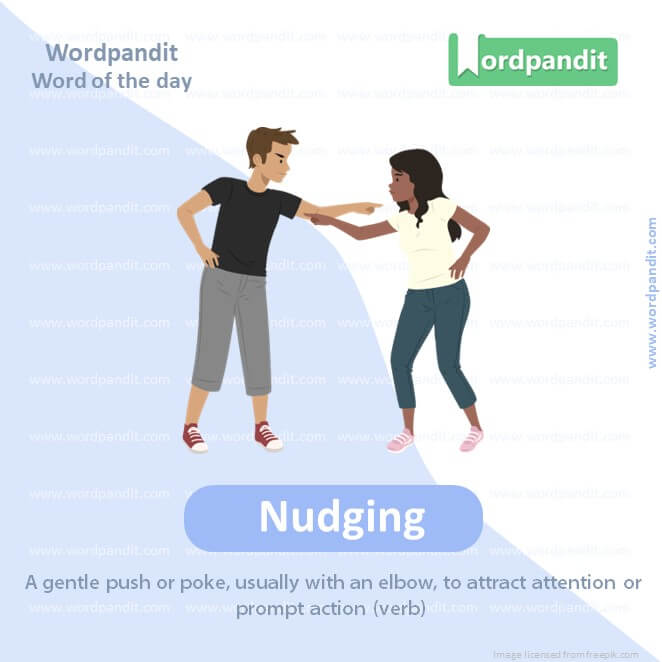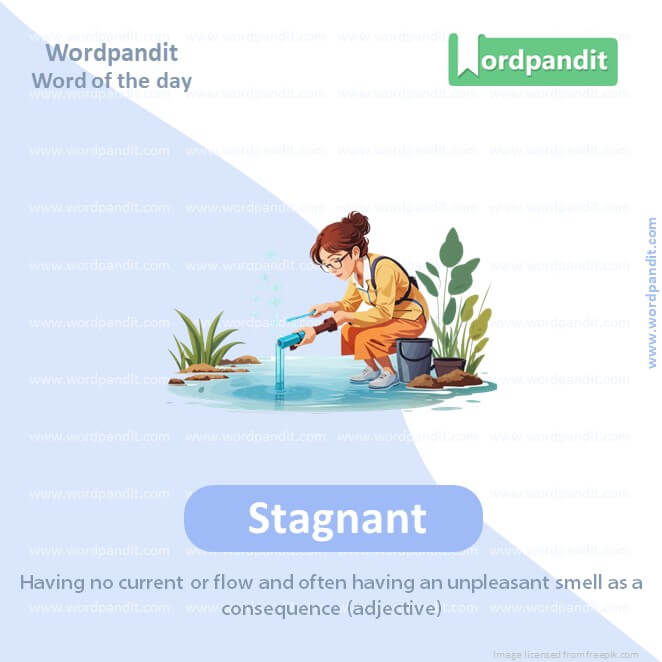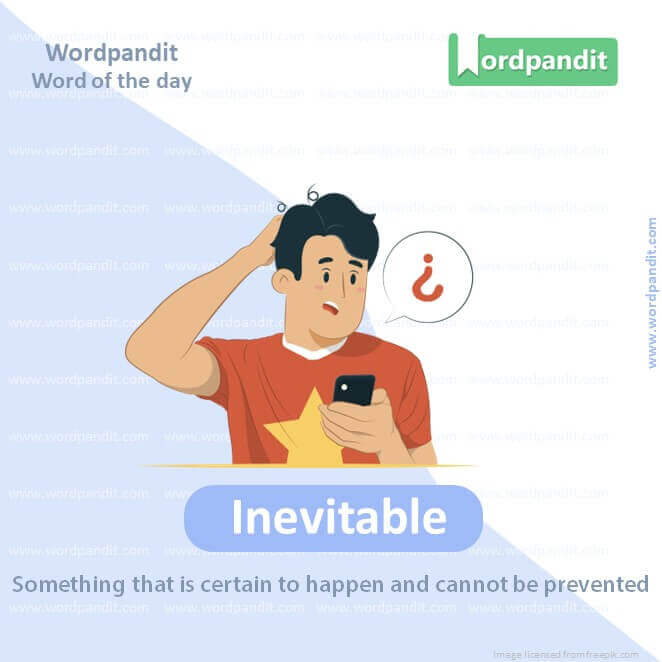Daily Vocabulary Words: List of Daily Used Words
Hi there. Welcome to this special section @ Wordpandit.
Our endeavour here is straightforward: highlighting important daily vocabulary words, you would encounter in The Hindu. This is your repository of commonly used words; essentially, we are posting a list of daily used words. Hence, this has significant practical application as it teaches you words that are commonly used in a leading publication such as The Hindu.
Visit the website daily to learn words from The Hindu.

WORD-1: Evocatively
CONTEXT: A deep-dive research report from global investment banking major Goldman Sachs, evocatively titled ‘India’s rise as the emerging services factory of the world’, has captured India’s recent success in providing global services and sought to forecast growth prospects and risks in the medium term.
SOURCE: The Hindu
EXPLANATORY PARAGRAPH: Imagine smelling cookies baking and immediately thinking of your grandma’s kitchen. That smell makes you remember a place or feeling, and that’s what “evocatively” means. It helps you remember or feel something very strongly.
MEANING: In a manner that brings strong images, memories, or feelings to mind
(adverb).
PRONUNCIATION: ih-VAH-kuh-tiv-lee
SYNONYMS: suggestively, poignantly, expressively, vividly, strikingly
USAGE EXAMPLE:
1. The novel begins evocatively, setting the scene of a quiet snowy night.
2. She spoke evocatively of her childhood on the farm.
3. The music was so evocatively composed that it brought tears to his eyes.
4. His paintings capture the landscape evocatively.
WORD-2: Unleashed
CONTEXT: The take-off trajectory of the country’s IT services sector, unleashed after critical economic reforms in 1991, is well known.
SOURCE: The Hindu
EXPLANATORY PARAGRAPH: When you let your dog off its leash in the park and it runs around happily, you have “unleashed” your dog. This means you have let it go free to run and play without being held back.
MEANING: Released from restraint or suddenly let loose (verb).
PRONUNCIATION: uhn-LEESHED
SYNONYMS: released, freed, let loose, discharged, liberated
USAGE EXAMPLE:
1. The new technology unleashed a wave of innovations.
2. His anger was finally unleashed after the provocation.
3. The storm unleashed heavy rains and strong winds.
4. She unleashed her creativity in her new art project.
WORD-3: Imprudent
CONTEXT: the firm’s analysts stress it would be imprudent to take India’s services growth for granted. Constraints that need attention include training graduates to be job ready, and the stress on natural resources in regions where growth is concentrated, as reflected in the water crisis at Bengaluru.
SOURCE: The Hindu
EXPLANATORY PARAGRAPH: If you run across the street without looking both ways, that’s being “imprudent.” It means you are not being careful or thinking about the consequences of your actions.
MEANING: Not showing care for the consequences of an action; rash (adjective).
PRONUNCIATION: im-PROO-dent
SYNONYMS: reckless, unwise, rash, careless, foolhardy
USAGE EXAMPLE:
1. It was imprudent to invest all his money in one venture.
2. Driving without a seatbelt is imprudent and dangerous.
3. Her imprudent remarks led to a misunderstanding.
4. They regretted their imprudent decision to travel without a map.
WORD-4: Munificent
CONTEXT: India may be roiling in heatwaves but the possibility of a munificent monsoon, as envisaged by the India Meteorological Department, may be contributing to some psychological relief.
SOURCE: The Hindu
EXPLANATORY PARAGRAPH: Imagine someone giving out giant bags of candy for no special reason, just because they want to. This person is being “munificent,” which means very generous or giving a lot.
MEANING: More generous than is usual or necessary (adjective).
PRONUNCIATION: myoo-NIF-i-sent
SYNONYMS: generous, lavish, bountiful, liberal, benevolent
USAGE EXAMPLE:
1. The munificent donation to the school allowed for new buildings.
2. His munificent nature made him beloved in the community.
3. They thanked him for his munificent hospitality.
4. A munificent reward was offered for the return of the lost dog.
WORD-5: Bleaching
CONTEXT: This will push the tropical Indian Ocean into a “near-permanent heatwave state”, accelerate coral bleaching and harm the fisheries sector.
SOURCE: The Hindu
EXPLANATORY PARAGRAPH: When you use special soap to make your white clothes even whiter, you’re “bleaching” them. This means making something lighter or whiter by using chemicals or sunlight.
MEANING: The process of using a chemical substance or sunlight to make something whiter or lighter in color (noun).
PRONUNCIATION: BLEE-ching
SYNONYMS: whitening, lightening, fading, decolorizing, purifying
USAGE EXAMPLE:
1. She was careful with the bleaching of her delicate clothes.
2. Over time, the sun had a bleaching effect on the curtains.
3. They used a natural bleaching agent to clean the surface.
4. The process of bleaching hair can be damaging if not done correctly.

WORD-6: Nudging
CONTEXT: These are linked to global warming with anthropogenic sources such as fossil fuel burning playing a significant role in nudging the planet closer to cataclysmic tipping points.
SOURCE: The Hindu
EXPLANATORY PARAGRAPH: Imagine you want to get your friend’s attention, but you don’t want to shout. So, you gently push them with your elbow. This gentle push is called a “nudge.” Nudging is a way to let someone know something in a quiet and gentle way.
MEANING: A gentle push or poke, usually with an elbow, to attract attention or
prompt action (verb).
PRONUNCIATION: NUH-jing
SYNONYMS: pushing, prodding, poking, elbowing, bumping
USAGE EXAMPLE:
1. He gave his friend a nudge to remind him to be quiet.
2. She used a subtle nudge to signal it was time to leave.
3. A nudge in the right direction can help someone make a decision.
4. The teacher nudged the sleeping student awake.

WORD-7: Stagnant
CONTEXT: Economic growth in India was stagnant in the socialist decades, and began to rise only after 1990.
SOURCE: The Hindu
EXPLANATORY PARAGRAPH: If water sits in a puddle for a long time and doesn’t move, it gets dirty and doesn’t look nice. We call this water “stagnant.” It means not fresh or not moving.
MEANING: Having no current or flow and often having an unpleasant smell as a consequence (adjective).
PRONUNCIATION: STAG-nant
SYNONYMS: motionless, still, inert, stale, idle
USAGE EXAMPLE:
1. The stagnant water in the pond attracted mosquitoes.
2. The economy was stagnant, with no growth in jobs or businesses.
3. They struggled to refresh the stagnant air in the room.
4. His career had become stagnant, and he felt no progress.

WORD-8: Lucrative
CONTEXT: In a free market economy, such stark differences in income levels would present lucrative arbitrage opportunities and help close the gap between the richest and the poorest.
SOURCE: The Hindu
EXPLANATORY PARAGRAPH: Imagine you set up a lemonade stand and sold so many cups that you got a lot of money from it. That’s what “lucrative” means—it’s a way to describe something that makes a lot of money.
MEANING: Producing a lot of money or paying a large amount of money.
PRONUNCIATION: LOO-kruh-tiv
SYNONYMS: profitable, profitable, gainful, remunerative, rewarding
USAGE EXAMPLE:
1. She found a lucrative opportunity in the tech industry.
2. Real estate can be a lucrative investment.
3. The deal proved to be highly lucrative for both companies.
4. He was always looking for lucrative business ventures.

WORD-9: Inevitable
CONTEXT: To be sure, wealth inequality is inevitable in a market economy as the market rewards people who are better at investing or allocating capital; investors who make profits see their wealth share grow over time while investors who suffer losses see their wealth share shrink.
SOURCE: The Hindu
EXPLANATORY PARAGRAPH: When something will definitely happen, like night coming after the day, we call this “inevitable.” It means it’s something that can’t be stopped or avoided.
MEANING: Something that is certain to happen and cannot be prevented.
PRONUNCIATION: in-EV-it-uh-bul
SYNONYMS: unavoidable, certain, sure, destined, unavoidable
USAGE EXAMPLE:
1. It was inevitable that the news would leak to the media.
2. They felt that conflict was inevitable.
3. Change is inevitable as time passes.
4. The success of the project was inevitable given the team’s hard work.
WORD-10: Entrepreneurial
CONTEXT: The extreme wealth disparity we see in India today, however, is largely not because of the free market rewarding the top 1% for their entrepreneurial capabilities.
SOURCE: The Hindu
EXPLANATORY PARAGRAPH: Think about someone who starts their own lemonade stand or creates their own game to sell. This person is being “entrepreneurial.” It means they are good at thinking of new ideas and starting businesses.
MEANING: Having the skills and initiative necessary to take good new ideas and turn them into successful businesses (adjective).
PRONUNCIATION: ahn-truh-pruh-NUR-ee-uhl
SYNONYMS: business-oriented, enterprising, innovative, pioneering, venturesome
USAGE EXAMPLE:
1. Her entrepreneurial spirit led her to start a new company.
2. The entrepreneurial course encouraged students to develop their own startups.
3. They supported entrepreneurial efforts with grants and resources.
4. His entrepreneurial success was inspiring to many young people.
Vocabulary Daily Words
Among the myriad aspects of language learning, the role of ‘vocabulary daily words’ attests to their undeniable importance. These everyday words form the bedrock of communication. Whether used in casual chat or formal discussion, the fluency and understanding of ‘vocabulary daily words’ can significantly uplift the quality of interaction. However, the vital question is, how to effectively learn these ‘vocabulary daily words’?
The crux of learning ‘vocabulary daily words’ lies in a well-rounded approach that encompasses exposure, understanding, memorization, and practice. Rote memorization might seem like a quick solution, but it lacks context and, thereby, retention. Hence, opt for a diverse range of resources like books, newspapers, podcasts, and digital media. These will bring ‘vocabulary daily words’ to life, providing real-life usage examples and making the learning process inherently engaging.
Next, using memory-enhancing techniques can significantly improve retention of ‘vocabulary daily words’. Techniques such as flashcards or the Leitner System align with the principles of spaced repetition, allowing more effective and long-term learning. Incorporating mnemonic devices, associating new words with unique stories or images, can further facilitate this learning process.
The key to fully grasping ‘vocabulary daily words’ lies in practical usage. Make it a habit to use these words in your daily communications. Whether it’s a friendly conversation, a professional email, or a social media post, try integrating these new words. Doing so provides hands-on practice, strengthening your comprehension and application of these words.
In a nutshell, ‘vocabulary daily words’ are a treasure in the language learning landscape. By harnessing diversified resources, utilizing memory techniques, and actively using these words, your grip on the ‘vocabulary daily words’ will strengthen significantly. So, turn the pages, hit play, start a conversation, and let these ‘vocabulary daily words’ shape the story of your linguistic journey.











